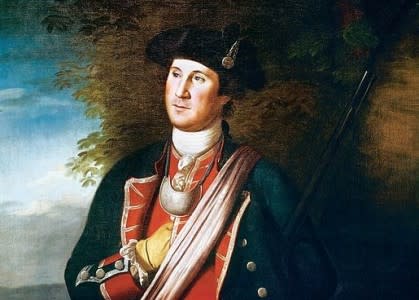Fascinating facts about George Washington for his real birthday
The national holiday called Washington’s Birthday may have passed, but today is George Washington’s real 285th birthday. Here are interesting facts about the first president, including his wealth, his career as a distiller, and the truth about those teeth.
George Washington in 1772.
Washington served a unique role as a military leader during the Revolution, as president of the Constitutional Convention in 1787, and the nation’s first president under the Constitution.
The void was great when Washington stepped down from office in 1797. The job description of president was pretty much written for Washington, and he ran unopposed for office.
As Washington’s second term was concluding, America saw the birth of political parties, those pesky rival factions that sprung up when the nation had to deal with life without George.
Here are other Washington facts that put his incredible public career in context, and address a few legends (and myths).
1. What’s the deal with the wooden teeth?
Research performed on a set of Washington’s dentures in 2005 showed they were made of gold, ivory, lead, and human and animal teeth.
2. OK, so the cherry tree story isn’t real either?
Not exactly. The story about Washington chopping down a tree and confessing to his father was in an early biography of Washington written by Parson Mason Locke Weems after Washington’s passing. Weems is known as a teller of tall tales, so most people today consider the tree tale a fable. But there were no known eyewitnesses either way. In other words, if Washington cut down the cherry tree in a forest, did it make a sound?
3. Washington was the richest president ever
Research from the website Wall Street 24/7 in 2010 listed Washington as the most wealthy president of all time, based on what his assets would be worth today: more than $500 million. Washington had significant land holdings and at least 800 slaves. But he also had debt problems during his lifetime.
4. Did Washington have to die when he did?
On December 13, 1799, the 67-year-old Washington came down with a cold and sore throat. He was dead within 48 hours. One modern theory is that Washington had acute epiglottitis, a painful condition caused by a bacterial infection that blocked his throat’s airway. His doctors also bled Washington heavily, which didn’t help matters.
Today, a tracheotomy would have helped Washington breathe for a while, and antibiotics probably would have stopped the infection. Those things weren’t part of the standard medical treatment in 1799.
5. Technically, Washington didn’t retire after he was president
He came out of retirement in 1798 when war with France was a possibility. President John Adams asked Washington to take command of the nation’s military and put together a force to fight the French. The following fall, Washington retired again to private life after the situation calmed down.
6. Was Washington really a moonshiner?
Washington made a style of whiskey we could consider “moonshine” today, except that he paid taxes and had a license. So we would consider him a distiller, since moonshiners don’t pay taxes. At one time, Washington’s distillery produced 11,000 gallons of whiskey in one year. As president, Washington sent military forces to western Pennsylvania to end the Whiskey Rebellion, when farmers refused to pay excise taxes.
7. And what’s the deal with George growing hemp?
Like other farmers, Washington grew hemp as a cash crop, but it’s not what you think. The hemp wasn’t smoked for pleasure. It was used to make rope, paper, and other products. Washington also grew corn and wheat. He was actually quite an agricultural innovator; he introduced the concept of crop rotation.
8. Were there any “George haters” when he was president?
Thomas Paine, the writer of Common Sense, wrote Washington in 1796 and said he prayed for Washington’s death. (Twenty years earlier, Washington had read Paine’s writings to his troops as they readied for battle.) Thomas Jefferson also criticized Washington publicly in a political war of words; in turn, Martha Washington hated Jefferson. The British also weren’t fond of Washington, but in a 2012 poll in Great Britain, General Washington was voted as the greatest military enemy to face the Empire–beating out Napoleon and German Field Marshal Erwin Rommel.
Constitution Daily History Stories About Washington
Forgotten facts about George Washington’s private life
Five lessons we can learn from George Washington’s Farewell Address


